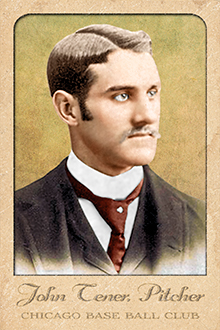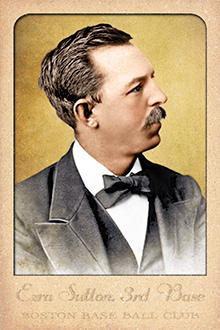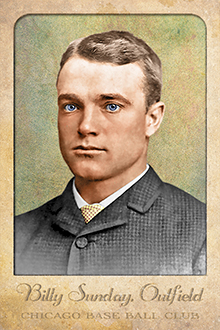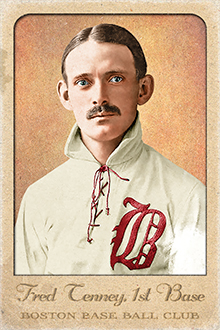
- Series: Pioneer Portraits II: 1875-1899
- City: Boston
- Team: Beaneaters
- League: National League
Frederick Tenney (1871-1952) built a twenty-year career in pro baseball, most of it in the major leagues and mostly in Boston. As a catcher, Tenney led his Brown University team to a “national championship” according to Harper’s Weekly in 1894. His play caught the attention of the Boston Beaneaters and he was signed to play for future Hall of Fame manager Frank Selee who developed Fred into a premier first-sacker. Through his friendship with Boston owner Arthur Soden, Tenney remained a loyal and evermore valued player-captain-manager and jack of all trades. His career as manager was lackluster in winning percentage but Fred was popular and the club made money, his and the team’s main objective. Sold to the Giants in 1908, Tenney had a great season at bat. Ironically, the sole game he missed that year was on September 23 when Fred Merkle subbed for him. The ensuing “boner” cost this great player his only shot at a World Series.
- Tenney was called the “Soiled Collegian” signifying his era’s disdain for university grads playing such a tawdry game
- The durable infielder holds the record for leading the NL in assists eight times, including seven straight years 1901-07
- Series: Pioneer Portraits II: 1875-1899
- City: Chicago
- Team: White Stockings
- League: National League
John Kinley Tener (1863-1946). Born in Ireland, Tener won 25 games for 3 teams over 4 seasons. In 1888, on Spalding’s world baseball tour, John was chosen to explain baseball to the Prince of Wales, later King Edward VII. At home, Tener was elected Secretary of John Ward’s pioneering player’s union, the Brotherhood of Professional Players. John became the 25th Governor of Pennsylvania, serving from 1911-15 & also served as NL president from 1913-18.
- Organized 1st Congressional Baseball Game, now an annual tradition
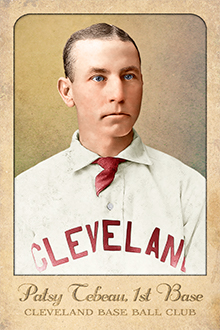
- Series: Pioneer Portraits II: 1875-1899
- City: Cleveland
- Team: Spiders
- League: National League
Oliver Wendell Tebeau (1864-1918) played first and third-base for five ML teams from 1887-1900. He was player-manager for three of those clubs 11 of his 13 seasons, squaring off with his arch-rival John McGraw and his Orioles. Tebeau led Cleveland during the rough-and-tumble era closing the 19th century. His obituary said he belonged to “the blood and iron brigade of baseball.” It was said that when the Spiders and Orioles met, “wild war raged up and down the field.” The august founding father of the game, Henry Chadwick, wrote in 1896 that Tebeau “degraded the game more than any player of the previous quarter century.” But the Cleveland fans loved Patsy and the League’s attempts to silence him soon faded.
- After retiring from the diamond, Tebeau ran a successful saloon in St. Louis
- Patsy couldn’t endure his wife’s decision to leave him and take the kids back to Cleveland. After his death at his own hand the local paper headlined: “Patsy Tebeau Acts as His Own Umpire”
- Series: Pioneer Portraits II: 1875-1899
- City: Boston
- Team: Beaneaters
- League: National League
Ezra Ballou Sutton (1849-1907). A 3rd baseman & shortstop, Sutton played for 5 teams over 20 seasons. Ezra was the 1st player to hit a home run in Major League baseball, and became the 1st player to hit 2 HRs in one game when he hit his second that day (in a losing effort). Sutton was also one of the 1st ball players to collect 1,000 career hits.
- Played in 1st National Association game: 5.4.71
- Played in 1st National League game: 4.22.76
- Lifetime .294 batting average
- Sutton is tied with 17 other players as the first player in major league baseball history
- Series: Pioneer Portraits II: 1875-1899
- City: Chicago
- Team: White Stockings
- League: National League
William Ashley Sunday (1862-1935) was born into extreme poverty and rose to become a beloved pro player making a handsome salary. In 1891 he gave that all up to pursue Christian ministry, cutting his income by two-thirds. Al Spalding had signed Sunday to his Chicago White Stockings on the recommendation of Cap Anson in 1883. His speed was his greatest asset.
- In ’85 Chicago held an exhibition with Sunday racing the speediest AA player. Billy won easily.
- His integrity and popularity led Anson to name Sunday the team’s business manager
- Sunday was recruited for the Players’ League in 1890, but remained loyal to his employer

